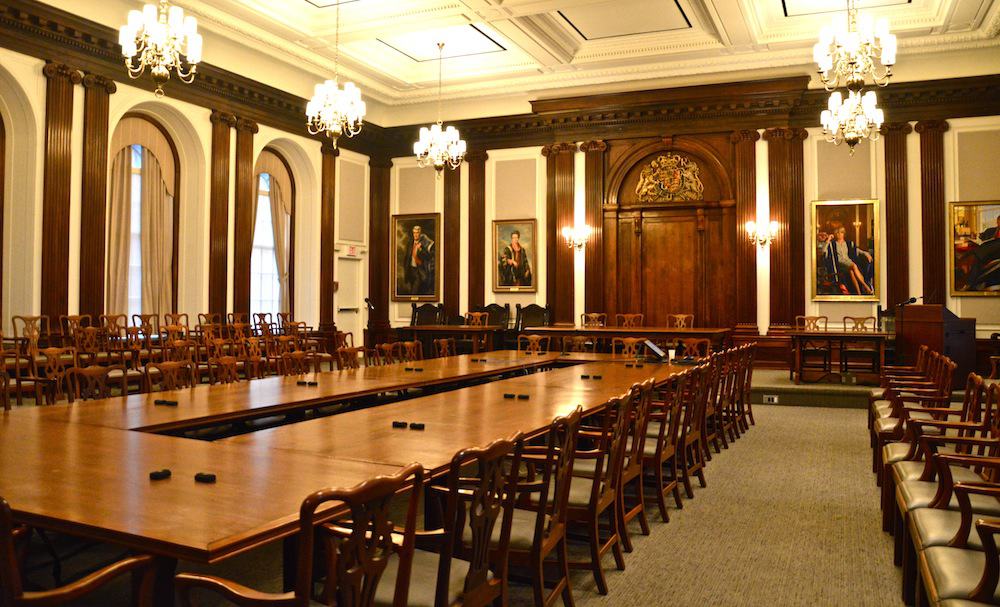On February 10, the University of Toronto Mississauga Students’ Union (UTMSU) sent a letter to participants in the Student Societies Summit stating that it would not be attending future meetings, citing both petitions from its members objecting to its participation, as well as concerns of its own. The letter was written by the UTMSU’s vice-president, external, Melissa Theodore.
“We believe further participation and implicit consent of the Summit will have a negative impact on our membership, and the student body as a whole,” reads the letter, “As a result, we also encourage other student groups to cease participation in the summit.” The union named a number of its objections to the summit: The summit represents a breach of the autonomy of students’ unions, fails to include a number of student groups who ought to have a part in the proceedings, has never had its scope or terms of reference clearly defined, and has encouraged the UTMSU and UTSU University of Toronto Students’ Union (UTSU) to violate contract law. UTMSU also argues that the Summit is undemocratic, seeks to negotiate from an unequal footing, and has not addressed issue of bullying and intimidation tactics.
Additionally, the letter stated that representatives of other divisional student groups at the summit have treated UTM students as “second-class students.” “We have been referred to as though we are not made up of individual, responsible, intelligent adults and as though we are not to have the same rights conferred to us as members of the UTSU as other students,” says Theodore.
“We have to question why this perception exists,” she continued, “On the face of it, the only things that are apparently different about our society and the others that exist at the Student Society Summit are that we are located farther away from the UTSU than most other societies and that we have a much higher proportion of racialized students on our campus and so tend to be represented by racialized members.” The letter notes that extremely few representatives at summit meetings have been women, mature students, people of colour, people with disabilities, international students, or trans students.
Theodore also notes that revealing the contract that delineates the UTMSU’s relationship with the UTSU would constitute a violation of contract law, as divulging the contents of the contract is against the provisions of the contract. Participants at summit meetings have nonetheless repeatedly requested that the contract be revealed. The UTMSU contends that doing so would open it up to litigation.
The reaction of other Summit participants to UTMSU’s withdrawal has been mixed. “It is disappointing that the UTMSU will not participate in future Summit meetings,” said Nishi Kumar, president of the University College Literary and Athletic Society, “I am also confused about their allegations of racism and sexism during meetings. I personally have not encountered any of the “aggression” from summit attendees that their statement describes, nor have my three female colleagues from SGRT. We are a diverse group, representing students from all backgrounds and experiences, and the Summit has encouraged active participation from all of us.”
Mauricio Curbelo, president of the Engineering Society, argued that the UTMSU’s decision to exit the Summit was motivated by a desire not to disclose their financial arrangement with the UTSU. “Their non-participation is proof that they are unable to defend the fee transfer in a public forum. The administration should ignore the UTMSU’s baseless grandstanding and continue with the Summit process,” he said.
The UTSU has not yet decided on a course of action in response to the UTMSU’s decision. “We have not yet had time to digest this ourselves, but it certainly gives us quite a bit to consider,” said Munib Sajjad, president of the UTSU.
Also on February 10, the leaders of a number of divisional student societies sent their own letter to faculty representatives at the summit. The letter states that the outcome of the summit must be a recommendation to change university policy, that the fee arrangement between the UTSU and UTMSU must be terminated or offered to every other divisional student society that requests it, and that constituencies must be allowed to cease their affiliation with campus- or university-wide student societies if they wish.
These divisional leaders further contend that the university’s Policy for Compulsory Non-Academic Incidental Fees ought to be changed. Their recommended changes include allowing every student society to have mechanisms by which it may change its constitutions, bylaws, and policies without Executive or Board consideration of their proposals, based solely on the decisions of its membership. They recommend also that non-U of T students must be banned from formally or informally participating as campaign volunteers in U of T student society elections.
The divisional leaders who signed this letter include Curbelo; Kumar; Jelena Savic, president of the Victoria University Students’ Administrative Council; Ben Crase and Maha Naqi, heads of Trinity College; Mary Stefanidis, president of the Innis College Student Society; Ashkan Azimi, president of New College Student Council; Alex Zappone, president of the St. Michael’s College Student Union; and Anthony O’Brien, president of the Kinesiology and Physical Education Undergraduate Association.


